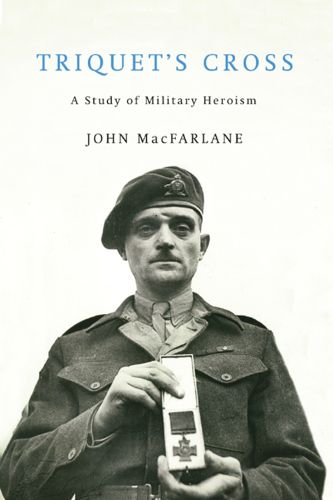Readings Newsletter
Become a Readings Member to make your shopping experience even easier.
Sign in or sign up for free!
You’re not far away from qualifying for FREE standard shipping within Australia
You’ve qualified for FREE standard shipping within Australia
The cart is loading…






In Triquet's Cross John MacFarlane tells the story of Paul Triquet, a French-Canadian soldier who was awarded the Victoria Cross for bravery in the battle for Casa Berardi during the Second World War.
One of only thirteen members of the Canadian Armed Forces to be awarded the highest military honour during the war, Triquet was later pressured to resign from the force due to the overwhelming public and political expectations that the award entailed. The role of hero did not suit Triquet and weighed heavily on him and his family. MacFarlane shows how Triquet's story was changed by those who wished to make his hero status the cornerstone in a political debate between francophones and anglophones, particularly with regard to his representing the Commonwealth despite his French-Canadian heritage.
Military heroism has changed in the postwar period, and heroes are no longer expected to be perfect models. But in 1944 Paul Triquet - perhaps the most popular Canadian hero of the war - was asked to conform to political, social, and military agendas. His story reveals much about Canadian and Quebecois society at the time and the history of French-Canadians in the Second World War.
$9.00 standard shipping within Australia
FREE standard shipping within Australia for orders over $100.00
Express & International shipping calculated at checkout
In Triquet's Cross John MacFarlane tells the story of Paul Triquet, a French-Canadian soldier who was awarded the Victoria Cross for bravery in the battle for Casa Berardi during the Second World War.
One of only thirteen members of the Canadian Armed Forces to be awarded the highest military honour during the war, Triquet was later pressured to resign from the force due to the overwhelming public and political expectations that the award entailed. The role of hero did not suit Triquet and weighed heavily on him and his family. MacFarlane shows how Triquet's story was changed by those who wished to make his hero status the cornerstone in a political debate between francophones and anglophones, particularly with regard to his representing the Commonwealth despite his French-Canadian heritage.
Military heroism has changed in the postwar period, and heroes are no longer expected to be perfect models. But in 1944 Paul Triquet - perhaps the most popular Canadian hero of the war - was asked to conform to political, social, and military agendas. His story reveals much about Canadian and Quebecois society at the time and the history of French-Canadians in the Second World War.